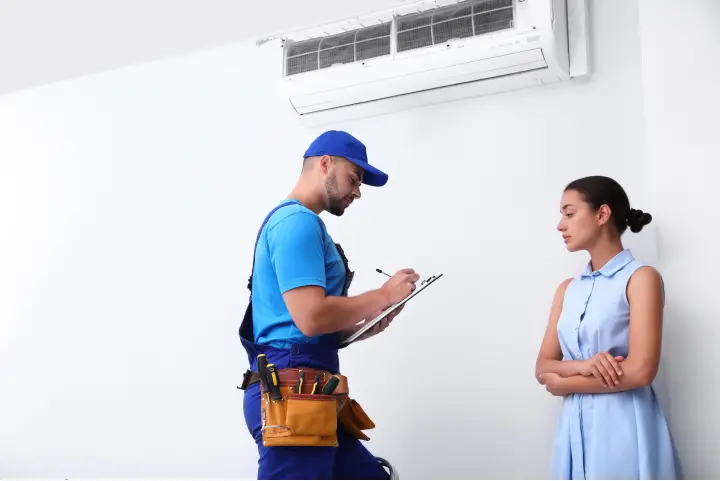
We all want our homes to be safe havens, places where we can relax, unwind, and breathe easy. But did you know that the air inside your home could be two to five times more polluted than the air outside? The good news is that you can improve indoor air quality in your home by implementing a few key strategies, including: regular cleaning and dusting, proper ventilation, controlling humidity levels, and using high-quality air filtration systems.
If the air we’re breathing during all that time is filled with pollutants, allergens, and other harmful particles, it can lead to a host of health problems. However, many homeowners find it challenging to know where to start or which solutions will be most effective for their existing HVAC systems.
That’s where we come in. At All Seasons Heating & Cooling, Inc., we specialize in providing top-notch HVAC products and services that directly address indoor air quality concerns. We offer state-of-the-art filtration equipment, specialized testing and monitoring tools to detect air quality diminishers, and we’re proud to partner with the trusted Carrier brand to bring you the best in air quality solutions.
But before we dive into our solutions, let’s go into more detail about why air quality matters so much.
How Does Indoor Air Quality Affect Your Health?
Indoor air quality affects your health in more ways than you might realize. If you have poor air quality, it will lead to immediate effects such as eye irritation, nose, and throat, headaches, dizziness, and fatigue. Long-term exposure to polluted indoor air can result in more serious illnesses like respiratory disease.
Many of us spend up to 90% of our time indoors, especially during the colder months. So poor quality is a silent problem that many of us don’t even realize we have until symptoms start to appear.
What Are the Symptoms of Poor Indoor Air Quality?
Recognizing the symptoms of poor indoor air quality is the first step in addressing the problem. Some common symptoms include:
- Frequent sneezing, coughing, and congestion
- Worsening allergy or asthma symptoms
- Dry or irritated eyes, nose, throat, and skin
- Headaches
- Dizziness
- Fatigue
- Difficulty concentrating
- Unpleasant odors that linger indoors
Addressing these symptoms typically involves a two-pronged approach: identifying and removing sources of pollution, as well as improving air filtration and ventilation. This is where professional-grade air quality solutions come into play, offering a more comprehensive and effective approach than basic consumer-grade products.
Poor indoor air quality can be effectively addressed with high-efficiency air filters, whole-home air purification systems, and proper ventilation by reducing the number of pollutants in your indoor air. Regular maintenance of your HVAC system also plays a crucial role in maintaining good air quality.
Ready to schedule service?
Fill out our form and we'll be in touch in 30 minutes or less!

Free 1" Filter w/ System Maintenance -or- 10% off Filters Larger than 1"
*Call for details on qualifying services. Cannot be combined with any other offer. Conditions apply.
Indoor Air Quality Systems
When it comes to improving your indoor air quality, having the right systems in place can make all the difference. But with so many options on the market, it can be overwhelming to know where to start. By integrating various systems that work together seamlessly, you can create a home environment that promotes health and comfort.
So let’s break down some of the key components of a robust indoor air quality system:
Whole Home Air Filtration
Air filtration is the cornerstone of any good indoor air quality system. It works by removing particles, allergens, and other pollutants from the air as it circulates through your HVAC system.
Air purifiers with high-efficiency particulate air (HEPA) filtration can capture particles as small as 0.3 microns. Our partnership with Carrier allows us to offer some of the most effective air purification systems on the market. These systems can remove up to 99.97% of airborne particles, including dust, pollen, pet dander, and even some bacteria and viruses.
Indoor Humidity Control
Maintaining the right level of humidity in your home is crucial for both comfort and health. Too much humidity can lead to mold growth and dust mite proliferation, while too little can cause dry skin, irritated sinuses, and even damage to your home’s wood furnishings.
This is where humidifiers come in. These systems work in tandem with your HVAC system to maintain ideal humidity levels year-round. Whether it’s adding moisture to dry winter air or removing excess humidity during muggy summer months, these systems ensure your home stays comfortable and healthy.
Indoor Ventilation
Without adequate ventilation, pollutants can build up inside your home – leading to a host of air quality issues. Many homes, especially newer, more energy-efficient ones, are built to be very airtight. While this is great for energy efficiency, it can lead to poor indoor air quality if not properly addressed.
The solution is a functional air cleaner. By having a constant supply of fresh air, these systems play a vital role in maintaining good indoor air quality.
How Does Poor Air Quality Affect Pets?
It’s not just people who suffer from poor indoor air quality, our furry friends are affected, too. Poor indoor air quality affects pets by exacerbating respiratory issues, causing skin irritations, and potentially leading to more serious health problems over time. Pets with pre-existing conditions, like asthma or allergies, can be even more sensitive to air pollutants than humans.
How to Improve Home Air Quality for Pets
Pets often spend even more time in the home than we do, and they’re closer to the ground where many pollutants settle. Pets themselves can also contribute to indoor air pollution through dander, fur, and tracked-in dirt and allergens.
To address this, start with the basics: regular grooming, frequent vacuuming (preferably with a HEPA filter vacuum), and washing pet bedding often. But for a more comprehensive solution, consider upgrading your home’s air filtration system. High-efficiency air filters can capture pet dander and other pet-related allergens, while whole-home air purification systems can help neutralize pet odors. Combined with proper ventilation, these solutions can significantly improve the air quality for both you and your pets.
Indoor Air Quality Solutions With All Seasons Heating & Cooling, Inc. HVAC Repair Services
At All Seasons Heating & Cooling, Inc., we’re committed to helping Vancouver WA residents breathe easier in their homes. We offer comprehensive indoor air quality assessments using specialized testing and monitoring equipment. This allows us to identify exactly what’s diminishing your air quality and recommend the most effective solutions.
Our partnership with Carrier means we can offer you the very best in air quality technology. From advanced filtration systems to smart thermostats that help manage your home’s air quality, we have solutions to address every aspect of indoor air quality. All Seasons Heating & Cooling, Inc.’s team of skilled technicians can install, maintain, and repair your air quality systems so they continue to perform at their best year after year.
So don’t let poor indoor air quality affect your health and comfort any longer! Contact us today to schedule an air quality assessment and take the first step towards breathing easier in your home. Give us a call today or submit a service request here. Our team is happy to answer any questions you may have.
Back to HVAC Repair